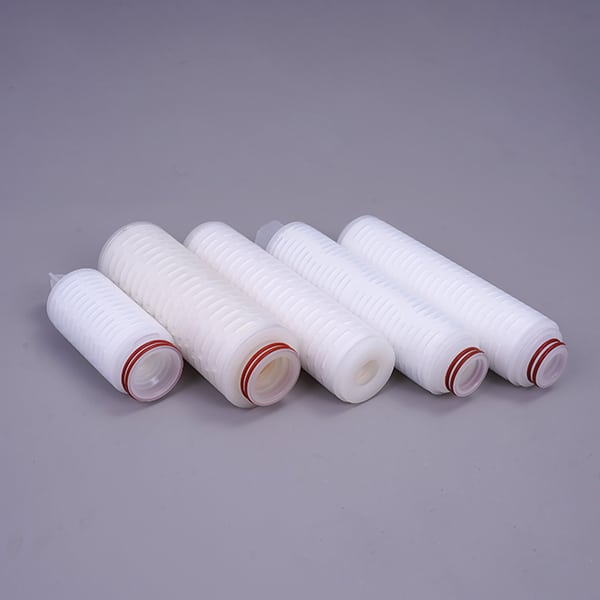
What is a Liquid Filter Cartridge?
A liquid filter cartridge is a vital component in many industrial and commercial filtration systems. These cartridges are tubular devices inserted into filter housings to remove unwanted particles, contaminants, and chemicals from liquids. They are widely used in industries like food and beverage, pharmaceuticals, oil and gas, and water treatment, where maintaining the purity of the liquid is critical.
Cartridge filters are designed to handle a wide range of liquid types, including water, solvents, oils, and chemicals, and they offer different levels of filtration depending on the needs of the application. Their efficiency, durability, and adaptability make them indispensable for various industries.
How Do Liquid Filter Cartridges Work?
Liquid filter cartridges function by trapping particles as liquids pass through them. They can be categorized into two main types based on their construction and how they capture contaminants:
- Surface Filters: These cartridges capture particles on the surface of the filter media, typically using materials such as polypropylene or polyester. Surface filters are highly effective at removing larger particles and contaminants from the liquid.
- Depth Filters: These filters consist of multiple layers of material through which the liquid must pass. As it does so, smaller particles get trapped within the layers, making depth filters ideal for applications requiring the removal of fine particles. Wound and melt-blown cartridges are common types of depth filters.
Choosing between surface and depth filters depends on the specific filtration needs of the application. Surface filters are ideal for scenarios where the liquid contains larger solid contaminants, while depth filters are better suited for fine particulate removal.
Types of Liquid Filter Cartridges
There are several types of liquid filter cartridges, each suited for different filtration tasks:
- Melt-Blown Cartridges: These depth filters are made from melted polymer materials, such as polypropylene, that are extruded into fine fibers. Melt-blown cartridges are great for removing fine particles and have high dirt-holding capacity, making them perfect for industrial applications where the liquid contains a lot of solid waste.
- Pleated Cartridges: These filters provide a large surface area by folding the filter material, allowing them to hold more contaminants while maintaining high flow rates. Pleated filters are excellent for applications requiring efficient filtration over long periods.
- String-Wound Cartridges: Made by wrapping yarn (typically polypropylene) around a central core, these depth filters are effective at removing suspended solids from liquids. They are highly durable and suitable for high-temperature and high-pressure applications.
- Sintered Metal Cartridges: These cartridges are made from sintered metal powder, providing excellent resistance to high temperatures and corrosive chemicals. They are used in industries like oil and gas where the filtration process involves harsh conditions.
Applications of Liquid Filter Cartridges
Liquid filter cartridges are highly versatile and used across numerous industries:
- Water Treatment: One of the most common uses of liquid filter cartridges is in water filtration systems. They help purify water by removing sediments, chlorine, and other contaminants before the water reaches consumers or is used in industrial processes.
- Food and Beverage Industry: Ensuring liquid purity is critical in the food and beverage industry, where any contamination can affect product quality. Filter cartridges are employed to remove sediments, bacteria, and other impurities from beverages like wine, beer, and soft drinks.
- Pharmaceuticals: In pharmaceutical manufacturing, liquid filter cartridges ensure that drugs and other medical products are free from harmful particles and contaminants. These filters help maintain the sterility of the liquids involved in drug production.
- Oil and Gas: In the oil and gas industry, liquid filter cartridges play a crucial role in refining processes by removing impurities from crude oil and other liquids. This ensures that the end product meets quality standards and helps extend the life of the equipment.
Choosing the Right Liquid Filter Cartridge
Selecting the appropriate filter cartridge depends on several factors:
- Particle Size: The size of the particles you want to remove is a primary consideration. For fine particles, depth filters such as melt-blown or string-wound cartridges are best, while pleated filters are more effective for larger particles.
- Flow Rate: The flow rate of the liquid through the filter is crucial. If a high flow rate is required, pleated filters are a good choice because of their large surface area, which allows for greater flow while maintaining effective filtration.
- Chemical Compatibility: Ensure that the materials of the filter cartridge are compatible with the liquid being filtered. For example, polypropylene is resistant to many chemicals, but it may not be suitable for highly acidic or solvent-rich liquids.
Durability and Temperature Resistance: Some applications, such as in the oil and gas industry, require filters that can withstand high temperatures and pressures. Sintered metal filters or stainless-steel cartridges are designed for such demanding environments.
Maintaining and Replacing Liquid Filter Cartridges
Regular maintenance is essential to ensure that liquid filter cartridges work efficiently. Over time, the filter media becomes clogged with particles, reducing flow rates and filtration efficiency. It’s important to monitor pressure differentials across the filter housing to know when a cartridge needs to be replaced.
Most filter cartridges are replaced when the pressure differential reaches a pre-set value, typically around 10 psi. Regular cleaning and proper handling of cartridges can also extend their lifespan.
Conclusion
Liquid filter cartridges are indispensable components in many industries, offering reliable and efficient filtration of liquids. By understanding the types of filters available and their specific applications, businesses can improve their processes, enhance product quality, and ensure compliance with industry standards. Whether you’re looking to purify water, produce pharmaceuticals, or refine oil, choosing the right filter cartridge can significantly impact the success and efficiency of your operations.

